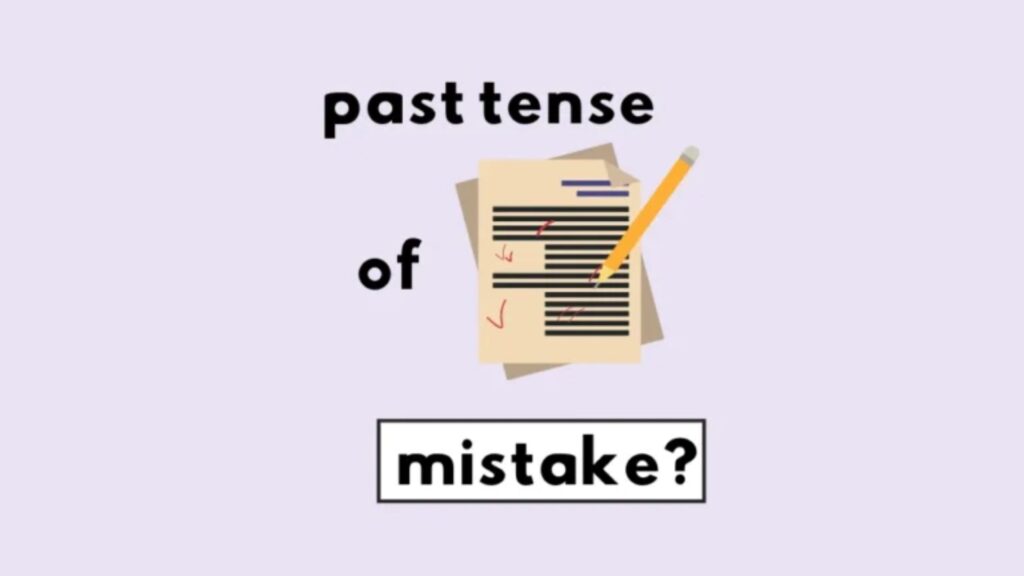If you’ve ever hesitated before writing “I mistook” or “I had mistaken”, you’re not alone. The verb “mistake” is an irregular verb, which means it doesn’t follow the standard “-ed” pattern. Instead, its correct conjugation follows the mistake/mistook/mistaken pattern similar to verbs like take/took/taken. Understanding this pattern is key to using mistook or mistaken correctly in different tenses.
What Does “Mistake” Mean?

According to the Cambridge Dictionary definition of mistake, as a verb, it means “to wrongly identify, understand, or judge someone or something.”
- Noun form: “An error or misjudgment.”
- Verb form: “To incorrectly interpret or confuse something.”
This dual role (noun and verb) is common in English, but our focus is on the verb mistake conjugation.
✅ Verb Forms of “Mistake” (Quick Overview)
Here’s how the irregular verb “mistake” conjugates:
| Tense | Verb Form | Example |
|---|---|---|
| Present (Base) | mistake | I often mistake faces in a crowd. |
| Third-Person Singular | mistakes | She mistakes him for his brother. |
| Simple Past | mistook | I mistook her for someone else. |
| Past Participle | mistaken | I’ve mistaken him before. |
| Present Participle | mistaking | They’re mistaking kindness for weakness. |
| Past Perfect (Pluperfect) | had mistaken | By then, I had mistaken his tone completely. |
This table makes it clear: “mistook” is the simple past tense, while “mistaken” is the past participle, usually paired with auxiliary verbs like have or had.
Mistook vs Mistaken: Core Difference

The difference boils down to tense:
- Mistook = simple past tense of mistake (a completed action).
- Mistaken = past participle of mistake, used in perfect tenses (have mistaken, had mistaken).
Think of it like take/took/taken:
- I took the wrong bus. (simple past)
- I’ve taken the wrong bus before. (past participle with “have”)
📧 Scenario Example: Using “Mistook” (Simple Past)
Here’s how you might use mistook in an email:
Subject: Apology for the Mix-up
Hi James,
I sincerely apologize for the confusion earlier. I mistook your colleague for our vendor representative and gave him the wrong documents. Thankfully, we corrected it quickly.
Thanks for your patience!
Best regards,
Carla Peterson
Here, mistook expresses a completed action in the past no auxiliary verb needed.
📧 Scenario Example: Using “Mistaken” (Past Participle)
Now let’s see mistaken in context:
Subject: Clarification Regarding Our Meeting
Hello Maya,
It seems I had mistaken the date of our meeting for next Friday instead of this one. Thank you for rescheduling; I truly appreciate your flexibility.
Kind regards,
Thomas Miller
Notice how had mistaken indicates a past perfect tense (pluperfect) a misjudgment that occurred before another past event (the rescheduled meeting).
🎯 Clear Rules & Patterns for Mistook vs Mistaken
Here’s how to use these correctly:
✔ Mistook (Simple Past)
- Use mistook when referring to one specific past event.
- No auxiliary verbs required.
Example: I mistook the address and ended up at the wrong office.
✔ Mistaken (Past Participle)
- Use mistaken with auxiliary verbs (have, has, had).
- Common in perfect tenses: present perfect (have mistaken) or past perfect (had mistaken).
Example: She has mistaken my silence for agreement.
🚫 Common Mistakes & Fixes
Mistaken or mistook used incorrectly often comes from tense confusion. Here are frequent errors:
❌ I have mistook him for a teacher.
✅ I have mistaken him for a teacher.
❌ Yesterday, I mistaken her for her sister.
✅ Yesterday, I mistook her for her sister.
🧠 Grammar Insight: Irregular Verb Analogy
If you struggle with mistake/mistook/mistaken, compare it to verbs you already know:
- take/took/taken
- shake/shook/shaken
This pattern helps reinforce the irregular verb conjugation rules.
🌍 Origin & Etymology of “Mistake”

The etymology of mistake traces back to Middle English (from misteken, meaning “to misunderstand”) and ultimately from Old Norse “mistaka” meaning “to take in error.” This history explains its irregular pattern it evolved before English standardized past tense rules.
🔧 Mistaking or Mistaken? (Continuous vs Past Participle)
Another confusion arises between mistaking and mistaken:
- Mistaking = present participle/continuous (ongoing): He keeps mistaking my accent for British.
- Mistaken = past participle/perfect tense: I had mistaken that word before.
📝 Quick Reference Table for “Mistake”
Here’s a compact guide:
| Form | Usage | Example Sentence |
|---|---|---|
| Present (mistake) | General truth/action | I often mistake people online. |
| Past (mistook) | Completed past action | I mistook him yesterday. |
| Past Participle (mistaken) | Perfect tenses | I’ve mistaken him before. |
| Past Perfect (had mistaken) | Earlier past action | She had mistaken the time. |
| Present Participle (mistaking) | Ongoing confusion | He’s mistaking friendliness for flirting. |
💡 Study Tip: Learn from Grammar Mistakes
Mastering irregular verbs like mistook or mistaken takes practice. Write down examples of mistook in sentences and examples of mistaken in sentences. Compare them side by side. Over time, this repetition cements the difference between simple past and past participle.
Final Thoughts
Knowing when to use mistook vs mistaken boils down to recognizing tense and structure. If it’s a straightforward past event, choose mistook. If it’s part of a perfect tense or uses auxiliary verbs (have/had), go with mistaken.
By applying these rules and practicing with realistic examples like emails you’ll avoid one of the most common English verb mistakes and sound more fluent.

